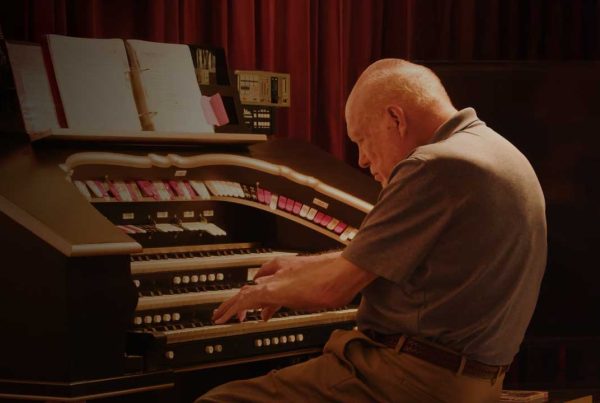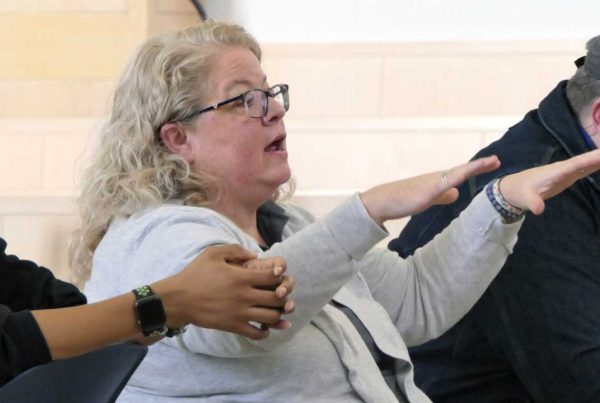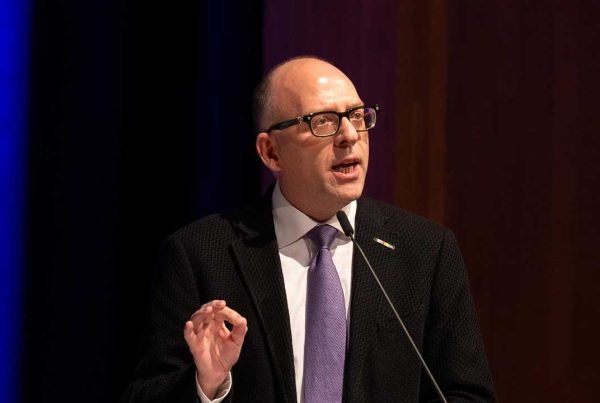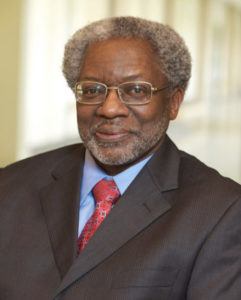 Dr. Rufus Burrow, Jr., Indiana Professor of Christian Thought and Professor of Theological Social Ethics Emeritus at CTS, died on August 24, 2021, after an incredibly impactful life of teaching and scholarship.
Dr. Rufus Burrow, Jr., Indiana Professor of Christian Thought and Professor of Theological Social Ethics Emeritus at CTS, died on August 24, 2021, after an incredibly impactful life of teaching and scholarship.
Burrow came to CTS as Visiting Professor of Church and Society in 1983 after completing his PhD in Social Ethics from Boston University. He spent a long and celebrated career as a member of the CTS faculty, becoming Assistant Professor of Church and Society in 1984, receiving tenure and promotion to Associate Professor in 1991, and becoming full Professor in 1998. Then, in 2002, he was appointed to the esteemed Indiana Professor of Christian Thought chair, a position he held into emeritus status in 2014. Through the years, he also taught courses at Anderson University/School of Theology, Martin University, and United Theological Seminary.
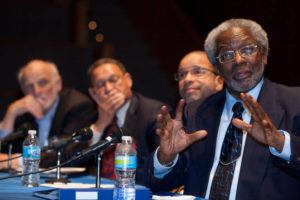 One of the most prolific faculty members in CTS’s history, Burrow wrote more than a dozen books, well over fifty articles, and he was at work on four additional manuscripts when he passed away. He was a renowned scholar of personalism (he wrote his dissertation on the theology of Edgar S. Brightman), social ethics, ethical prophecy, Black theology, and nonviolence.
One of the most prolific faculty members in CTS’s history, Burrow wrote more than a dozen books, well over fifty articles, and he was at work on four additional manuscripts when he passed away. He was a renowned scholar of personalism (he wrote his dissertation on the theology of Edgar S. Brightman), social ethics, ethical prophecy, Black theology, and nonviolence.
He is most well-known as one of the world’s leading scholars of Martin Luther King, Jr., about whom he wrote numerous articles and chapters, five books, edited a sixth, and was at work on a seventh. Among these are the memorable God and Human Dignity: The Personalism, Theology, and Ethics of Martin Luther King, Jr. (University of Notre Dame Press), Martin Luther King, Jr. for Armchair Theologians (Westminster John Knox, Press), and Martin Luther King, Jr., and the Theology of Resistance (McFarland).
Along with his work in the academy, Burrow was committed to the life of the church. A consistent advocate for justice in the church and the larger community, one of his final publications was Making Good the Claim: Holiness and Visible Unity in the Church of God Reformation Movement (Wipf and Stock), which challenged leaders and members in the Church of God movement to “make good” on their tradition’s historical commitments to racial justice and unity.
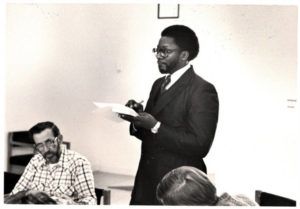 Equal to if not greater than his scholarly and ecclesial contributions is his influence on generations of CTS students. Known as a demanding, encouraging, incisive, supportive, and eminently fair teacher, Burrow is celebrated for his enormous impact on the formation of countless pastors, scholars, counselors, and community leaders. His classes on Ethical and Prophetic Witness of the Church and The Theological Ethics of Martin Luther King, Jr., were staples in the CTS community for many years, and he taught widely on topics including Reinhold Niebuhr, James Cone, the sociology of religion, liberation theologies, the Black religio-cultural experience, and church and the urban poor.
Equal to if not greater than his scholarly and ecclesial contributions is his influence on generations of CTS students. Known as a demanding, encouraging, incisive, supportive, and eminently fair teacher, Burrow is celebrated for his enormous impact on the formation of countless pastors, scholars, counselors, and community leaders. His classes on Ethical and Prophetic Witness of the Church and The Theological Ethics of Martin Luther King, Jr., were staples in the CTS community for many years, and he taught widely on topics including Reinhold Niebuhr, James Cone, the sociology of religion, liberation theologies, the Black religio-cultural experience, and church and the urban poor.
The news of Burrow’s passing has been met with an outpouring of love and appreciation from CTS alumni. Dr. Lawrence Burnley, Vice President for Diversity and Inclusion at the University of Dayton, said, “Rufus stood firmly in the prophetic and priestly traditions of the church. He spoke truth to power and had a special place in his heart for ‘the least’ among us. I can say with great clarity that no single individual outside of my biological family has had a more profound impact on the trajectory of my ministerial and professional journey. God allowed Rufus to see in me what I didn’t see in myself. He helped me to see myself in others and love them as such.”
Rev. Ayanna Garrett, Associate Dean for Student Life at CTS, recalled, “Dr. Burrow was an amazing teacher, theologian and scholar. He taught me about my responsibility to do justice in the world. Although it’s been over 15 years since I have been in his classroom, his words still ring in my ear: ‘You must not only speak of justice, but it is imperative that your actions do justice as well.’”
Reflecting on his time with Burrow as a student, Rev. Dustin Hite, Senior Pastor at First Christian Church in Bargersville, IN, said, “His classes re-framed for me the prophetic and ethical role of the Church in the world, and he exposed me to ideas and writers and scholars who opened my eyes and deepened my faith in ways that still bear fruit today. To say the Church has lost an intellectual and prophetic giant is an understatement; to say that I am sad more students will not have the privilege of sitting under his teaching only begins to scratch the surface of how I’m feeling right now. Because of Dr. Burrow, I am a better pastor, Christian, and human being. His impact upon the body of Christ will live on in the hundreds of students who sat under his teaching.”

